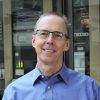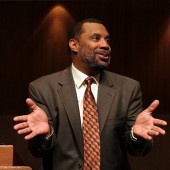Today the world is literally at our fingertips through amazing technology, but what is all this access and information doing to us? Craig Detweiler, professor, filmmaker, cultural commentator and author says how we use technology shapes our faith in more ways than we realize. He joins Neil to unpack the connection between God and technology.
Highlight – The right role for Facebook
How technology shapes our faith
In Craig’s book, iGods: How Technology Shapes Our Spiritual and Social Lives, he gives an overview of the impact of 21st-century technology.
• Access – the internet has increased our access to literature, music, history, politics, cultural commentary, and flesh-and-blood people who live thousands of miles away.
• Aesthetics – companies like Apple “bring beauty to technology” by making iPhones, laptops, and iPads smooth, pleasing to the eye, and easy to use.
• Abundance – we have “limitless choices” in our hands, which even the royalty of past centuries did not have; in Craig’s words we’ve become “kings of our own making.”
• Algorithms – we can bring order to a chaotic environment through algorithms, both online and in our own lives. ‘Algorithms’ for the Christian life would be called reading the Bible, times of prayer, and meeting regularly with other believers.
• Authority – the constant trading of information via technology has led to questions about credibility and authority – i.e., the “check your sources” argument.
• Authenticity – we can be more transparent but more hidden than ever in an era of Twitter posts, hashtags, Facebook pictures, and personal blogs. But the temptation is to create a persona that is stronger, more put-together, and happier than what is truly the case.
Many of these traits can be traced back to our identity as image-bearers of God. God Himself was the original “technologist.” He organized information, created light and dark, and set up a foundational blueprint for the world. Because of our sin, we can take gifts of information like smart phones and computers and start to treat them like God. We bring our questions to the device in our pocket rather than to God. Craig says this also affects how we approach faith and trust. “We expect to get immediate answers, yet the Bible describes asking, seeking, and knocking.” The concept of waiting is now seen as an “old-fashioned virtue.”
How can we start to unplug?
Craig suggests disconnecting from technology, as a person, a Church, or a family, and taking some time to rediscover the silence and patience that come from waiting on God. We recover much more time in our day and can reconnect with others in a real, genuine, imperfect way. That’s the way we were wired to live our lives – up close, personal, broken, but real.






















